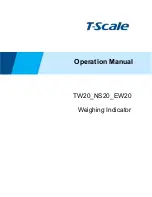
QA-T5 OPERATING INSTRUCTIONS
I.
Product Overview:
This data logger can be used for temperature recording during the storage and transport
of food, medicine, chemicals and much more. It is widely used in warehousing, cold
storage, refrigerated logistics and laboratories that have a need to track temperature
fluctuations over time.
II.
Specifications:
Dimensions: 3.1" x 1.2" x 0.5"
Weight: 30g
III.
Technical:
1.
Units: °F or °C selectable
2.
Range: -22°F to 158°F (-30°C to 70°C)
3.
Accuracy: ±0.9°F (-4°F to 104°F) otherwise ±2.0°F
4.
Resolution: 0.1°
5.
Capacity: 32,000 data points
6.
Recording Intervals: 10 seconds to 24 hours
(adjustable)
7.
Sensor: Internal NTC thermal resistor
8.
Comm Interface: Built-in USB
9.
IP Rating: IP67 Waterproof
10.
Power: CR2032 battery or USB
11.
Battery Life: 180 days at room temperature
(15 minute interval)
IV.
Start Up
1.
Download and install the free QA-T5 software and USB driver by following the
prompts and Installation Tips. (
software is available at www.QAsupplies.com)
2.
Connect the logger to an open USB port and Open the software. The logger will
automatically communicate with the software and upload any data. Exit from the
connection interface if necessary
(should not be required on initial use)
.
3.
Click the Parameter Set icon in the tool bar. After choosing the logger settings, click
the "Save Parameter" button
(see the help file for details or questions on any setting)
.
4.
Exit from the parameter interface and disconnect the logger.
5.
Once all loggers are programmed using steps 1-4, select Exit from the menu bar to
close the QA-T5 software
(see below to Start Recording)
.
V.
Data Access:
Recorded data can be easily accessed directly from the logger and this process will NOT
clear the logger or stop the recording process.
1.
Connect the logger to a computer through an open USB port, the icon will show
on the logger's LCD.
2.
Open the software and the logger will automatically display the recorded data. If not,
click the Upload Data icon in the tool bar.
3.
To view the logger settings click the Connection icon in the tool bar. When finished
exit from the connection interface.
4.
Select Exit from the menu bar to close the QA-T5 software.
VI.
Functions:
The data logger has two buttons. The left button is to start recording and switch between
menu items. The right button is to stop recording and return to the menu.
The data logger display interface includes: Status, Recording Capacity, Time, Date, Max
Temperature, Min Temperature, Upper and Lower Alarm Limits.
If there is no operation for 15 seconds, the data logger will automatically turn off the
display. If the display is turned off, short press the left button to enter the display
interface. Each time the left button is short pressed, it will cycle through the display
interface in the sequence described in the Figures below.
Status Display (Figure 1)
After short pressing the left button, it enters the Status display.
The temperature shown on the screen is the current ambient
temperature.
If the symbol lights up, the data logger is in recording status.
If the symbol flashes, the data logger is in delayed start status.
If the symbol lights up, the data logger has stopped recording.
If neither the or symbols light up, the data logger has been configured.
If the or symbols light up, the measured temperature exceeded an alarm limit.
Recording Capacity Display (Figure 2)
When the "Log" symbol lights up, it indicates the recorded data
capacity. The number shown in the LCD is the amount of currently
recorded temperatures.
Time Display (Figure 3)
The time display interface shows the hour and minute of the data
logger
(time format is 24 hours)
.
Date Display (Figure 4)
The date display interface shows the month
(“M”)
and day
(“D”)
of the
data logger.
Max. Temperature (Figure 5)
The maximum temperature measured since the logger started
recording.
Min. Temperature (Figure 6)
The minimum temperature measured since the logger started
recording.
Upper Alarm Limit (Fig. 7) Lower Alarm
Alarm limit values are set by
Limit (Fig. 8)
the user in the QA-T5 software.




















